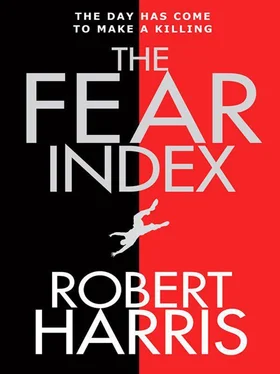Robert Harris - The Fear Index
Здесь есть возможность читать онлайн «Robert Harris - The Fear Index» весь текст электронной книги совершенно бесплатно (целиком полную версию без сокращений). В некоторых случаях можно слушать аудио, скачать через торрент в формате fb2 и присутствует краткое содержание. Жанр: Триллер, на английском языке. Описание произведения, (предисловие) а так же отзывы посетителей доступны на портале библиотеки ЛибКат.
- Название:The Fear Index
- Автор:
- Жанр:
- Год:неизвестен
- ISBN:нет данных
- Рейтинг книги:4 / 5. Голосов: 1
-
Избранное:Добавить в избранное
- Отзывы:
-
Ваша оценка:
- 80
- 1
- 2
- 3
- 4
- 5
The Fear Index: краткое содержание, описание и аннотация
Предлагаем к чтению аннотацию, описание, краткое содержание или предисловие (зависит от того, что написал сам автор книги «The Fear Index»). Если вы не нашли необходимую информацию о книге — напишите в комментариях, мы постараемся отыскать её.
The Fear Index — читать онлайн бесплатно полную книгу (весь текст) целиком
Ниже представлен текст книги, разбитый по страницам. Система сохранения места последней прочитанной страницы, позволяет с удобством читать онлайн бесплатно книгу «The Fear Index», без необходимости каждый раз заново искать на чём Вы остановились. Поставьте закладку, и сможете в любой момент перейти на страницу, на которой закончили чтение.
Интервал:
Закладка:
At midnight the guests had gone out into the garden and lit small candles – ‘you know, those tea-light things’ – and put them into paper balloons. Dozens of softly glowing lanterns had lifted off, rising quickly in the cold still air like yellow moons. Someone had called out, ‘Make a wish!’ and Quarry, Hoffmann and Gabrielle had all stood together silently with their faces upturned, misty-breathed, until the lights had dwindled to the size of stars and disappeared. Afterwards Quarry had offered to drive Hoffmann home, whereupon Gabrielle, to his irritation, had tagged along, sitting in the back seat and giving them her life story without being asked for it – some kind of joint degree in art and French from a northern university Quarry had never heard of, a masters at the Royal College of Art, secretarial college, temp jobs, the UN. But even she had shut up when they got inside Hoffmann’s apartment.
He had not wanted to let them in, but Quarry had pretended he needed to use the loo – ‘honestly, it was like trying to get off with a girl at the end of a bad evening’ – and so reluctantly Hoffmann had led them up to the landing and unlocked his door on to a vivarium of noise and tropical heat: motherboards whirring everywhere, red and green eyes winking out from under the sofa, behind the table, stacked on the bookshelves, bunches of black cables festooned from the walls like vines. It reminded Quarry of a story he had read just before Christmas about a man in Maidenhead who kept a crocodile in his garage. In the corner was a Bloomberg terminal for online home traders. On his return from the bathroom, Quarry had looked in at the bedroom – more computers taking up half the bed.
He had come back into the living room to find that Gabrielle had made room for herself on the sofa and kicked off her shoes. He said, ‘So what’s the deal here, Alex? It looks like Mission Control.’
At first Hoffmann had not wanted to talk about it, but gradually he had begun to open up. The object, he said, was autonomous machine-learning – to create an algorithm which, once given a task, would be able to operate independently and teach itself at a rate far beyond the capacity of human beings. Hoffmann was leaving CERN to pursue his research alone, which meant he would no longer have access to the experimental data emanating from the Large Electron-Positron Collider. For the past six months, therefore, he had been using data streams from the financial markets instead. Quarry had said it looked an expensive business. Hoffmann had agreed, although the main cost to him was not in microprocessors – many of which he had been able to salvage from scrap – or the cost of the Bloomberg service, so much as in electricity: he was having to find two thousand francs a week simply to bring in sufficient power; he had twice blacked out the neighbourhood. The other problem, of course, was bandwidth.
Quarry had said cautiously, ‘I could help you out with the cost, if you’d let me.’
‘No need. I’m using the algorithm to pay for itself.’
It had taken an effort for Quarry to stifle his gasp of excitement. ‘Really? That’s a neat concept. And is it?’
‘Sure. It’s just a bunch of extrapolations drawn from basic pattern analysis.’ Hoffmann had shown him the screen. ‘These are the stocks it’s suggested since December first, based on price comparisons using data from the past five years. Then I just email a broker and tell him to buy or sell.’
Quarry had studied the trades. They were good, if small: nickel-and-dime stuff. ‘Could it do more than cover costs? Could it make a profit?’
‘Yeah, in theory, but that would need a lot of investment.’
‘Maybe I could get you the investment.’
‘You know what? I’m not actually interested in making money. No offence, but I don’t see the point of it.’
Quarry couldn’t believe what he was hearing: he didn’t see the point!
Hoffmann had not offered him a drink, or even a seat – not that there was room to sit now that Gabrielle had taken the only available space. Quarry was left standing sweating in his ski jacket.
He said, ‘But surely if you did make money then you could use the profits to pay for more research? It would be what you’re trying to do now, only on a vastly bigger scale. I don’t want to be rude, man, but look around. You need to get some proper premises, more reliable utilities, fibre optics…’
‘Perhaps a cleaner?’ Gabrielle had added.
‘She’s right, you know – a cleaner wouldn’t hurt. Look, Alex – here’s my card. I’m going to be in the area for the next week or so. Why don’t we meet up and talk this through?’
Hoffmann had taken the card and put it in his pocket without looking at it. ‘Maybe.’
At the door Quarry had bent down and whispered to Gabrielle, ‘Do you need a ride? I’m driving back to Chamonix. I can drop you in town somewhere.’
‘It’s all right, thanks.’ A smile as sweet as acid. ‘I thought I might stay here for a while and settle your bet.’
‘Suit yourself, darling, but have you seen the bedroom? Best of bloody luck.’
Quarry had put up the seed money himself, used his annual bonus to move Hoffmann and his computers into an office in Geneva: he needed a place where he could bring prospective clients and impress them with the hardware. His wife had complained. Why couldn’t his long-discussed start-up be based in London? Wasn’t he always telling her that the City was the hedge-fund capital of the world? But Geneva was part of the attraction to Quarry: not just the lower tax, but the chance for a clean break. He had never had any intention of moving his family to Switzerland – not that he told them that, or even acknowledged it to himself. But the truth was, domesticity was a stock that no longer suited his portfolio. He was bored with it. It was time to sell up and move on.
He decided they should call themselves Hoffmann Investment Technologies in a nod to Jim Simons’s legendary quant shop, Renaissance Technologies, over in Long Island: the daddy of all algorithmic hedge funds. Hoffmann had objected strongly – the first time Quarry had encountered his mania for anonymity – but Quarry was insistent: he saw from the start that Hoffmann’s mystique as a mathematics genius, like that of Jim Simons, would be an important part of selling the product. AmCor agreed to act as prime brokers and to let Quarry take some of his old clients with him in return for a reduced management fee and ten per cent of the action. Then Quarry had hit the road of investors’ conferences, moving from city to city in the US and across Europe, pulling his wheeled suitcase through fifty different airports. He had loved this part – loved being a salesman, he who travels alone, walking in cold to an air-conditioned conference room in a strange hotel overlooking some sweltering freeway and charming a sceptical audience. His method was to show them the independently back-tested results of Hoffmann’s algorithm and the mouth-watering projections of future returns, then break it to them that the fund was already closed: he had only fulfilled his engagement to speak in order to be polite but they didn’t need any more money, sorry. Afterwards the investors would come looking for him in the hotel bar; it worked nearly every time.
Quarry had hired a guy from BNP Paribas to oversee the back office, a receptionist, a secretary, and a French fixed-income trader from AmCor who had run into some regulatory issues and needed to get out of London fast. On the technical side, Hoffmann had recruited an astrophysicist from CERN and a Polish mathematics professor to serve as quants. They had run simulations throughout the summer and had gone live in October 2002 with $107 million in assets under management. They had made a profit in the first month and had gone on doing so ever since.
Читать дальшеИнтервал:
Закладка:
Похожие книги на «The Fear Index»
Представляем Вашему вниманию похожие книги на «The Fear Index» списком для выбора. Мы отобрали схожую по названию и смыслу литературу в надежде предоставить читателям больше вариантов отыскать новые, интересные, ещё непрочитанные произведения.
Обсуждение, отзывы о книге «The Fear Index» и просто собственные мнения читателей. Оставьте ваши комментарии, напишите, что Вы думаете о произведении, его смысле или главных героях. Укажите что конкретно понравилось, а что нет, и почему Вы так считаете.










